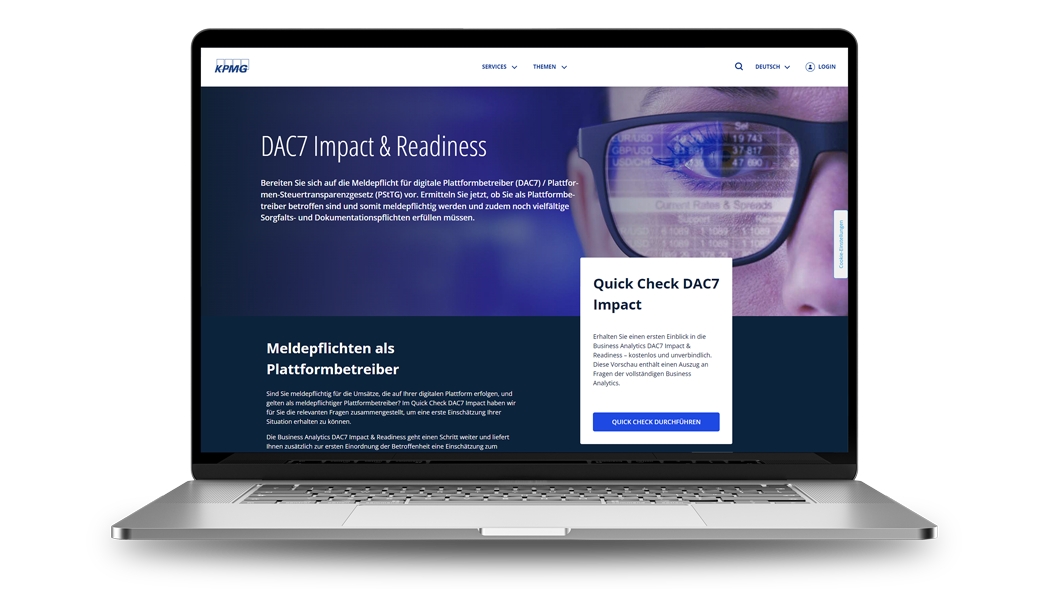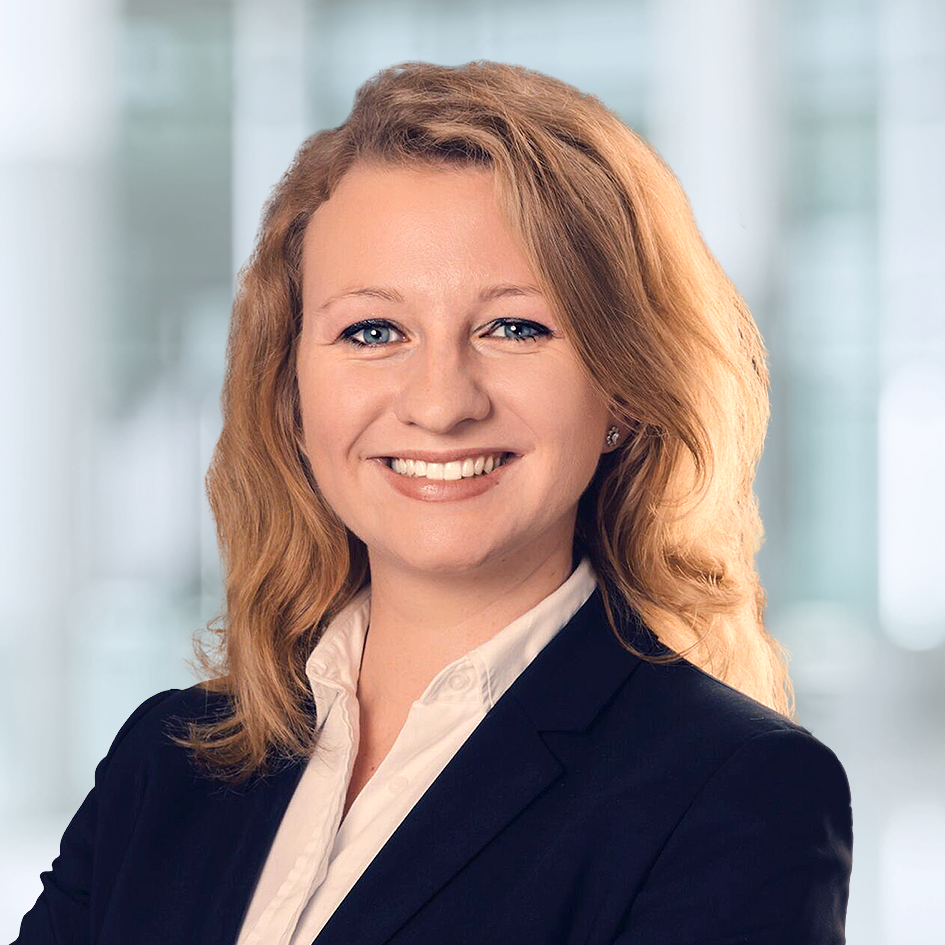New rules on CFC taxation: How you can prepare
Find out whether you are affected by the new stricter rules on CFC taxation and therefore must fulfill extensive additional declaration obligations.
CFC taxation is the tax on „passive income” of a low-taxed foreign corporation that is paid by a shareholder liable to tax in Germany although this type of income is not distributed to the shareholder.
Quick Check German CFC Impact & Readiness

German CFC Taxation under the Anti-Tax Avoidance Directive (ATAD)
Do the German CFC regulations governing your activity abroad require you to pay tax on "dry income" and/or submit an additional declaration to the tax office? Use our Quick Check to get an initial indication. The ATAD Implementation Act has led to a comprehensive reform of CFC taxation in Germany. Germany has fulfilled its obligation to implement the minimum standards from Art. 7 and 8 of the Anti-Tax Avoidance Directive (ATAD). The revised regulations apply for the first time to a controlled foreign company’s CFC income generated in a financial year beginning after December 31, 2021.
The new requirements must therefore be incorporated into the declaration obligations rapidly and practically. The BMF circular dated 22.12.23 explains the new rules on CFC taxation in over 700 recitals. In many areas, Germany is taking a stricter approach than other EU member states. Our Quick Check offers you assistance with an initial self-assessment to find out if the many new rules affect your company. This is done intuitively using simple questions and examples.

Important
Please note that this is a non-binding, rough initial evaluation on a self-assessment basis, for which KPMG assumes no liability. This question tool is not exhaustive. It cannot cover all possible scenarios in which CFC taxation is triggered. It is not a substitute for tax advice.
Do you have any questions or suggestions about our Quick Check?
Contact us. We would be happy to answer your questions.
More interesting content for you
KPMG Tax Global
Think globally, act locally, be successful internationally! Find out more about KPMG's tax advisory services.
> Learn more now
International Transaction Tax
Competent support for complex transaction and transformation projects. In complex and cross-border projects, we specialize in the situations that arise in day-to-day business.
> Learn more now
BEPS 2.0 Pillar 2
The introduction of the global minimum tax rate represents a paradigm shift in international tax law. We support you in developing an individual BEPS 2.0 strategy.
> Learn more now

DAC7 Impact & Readiness
Prepare for the reporting requirements facing digital platform operators (DAC7)/Platform Tax Transparency Act (PStTG). Find out now whether you as a platform operator are impacted and thus subject to a reporting obligation, and also whether you must comply with the various due diligence and documentation obligations.
Good to know
The CFC (controlled foreign company) rules refer to the taxation of certain passive income of a low-taxed foreign corporation at a shareholder liable for tax in Germany. Without a distribution taking place, the foreign passive income is attributed to the German shareholder and taxed as if it had been accrued in Germany. The CFC rules therefore result in a breach of the separation principle for the foreign corporation. The objective is to prevent the shift of income to a low-tax country.
The CFC rules were introduced in Germany in 1972 and have been updated several times since then. The Anti-Tax Avoidance Directive (ATAD) establishes an EU-wide minimum standard for the CFC rules. The law implementing the Minimum Taxation Directive reduced the low taxation threshold from 25% to 15% from 2024.
Taxation under the German External Tax Relations Act may apply if a German resident holds a direct or indirect majority interest in a foreign corporation, either alone or together with related parties (e.g. via other group companies), e.g. in the profit, capital, voting rights or liquidation proceeds. Minority interests may also come under the scope of application if the foreign corporation generates income from investments, e.g. interest income or free float dividends.
Only certain passive income of the foreign corporation is subject to the CFC rules. In addition, the foreign corporation must be subject to low taxation, meaning its effective income tax rate must be less than 25% (for the years up to 2023) or less than 15% (for the years from 2024).
Corporations resident in an EU/EEA member state are exempt from the CFC rules if the taxpayer can prove that they generate their passive income from their own economic activity (referred to as the substance or motive test).
A catalog of active income that is not subject to the CFC rules is defined conclusively by law. Conversely, all other activities of the foreign company resulting in passive income may in principle fall within the scope of the CFC rules. Important sources of active income are, for example, agriculture and forestry; the manufacture, processing and assembly of goods; and the generation of energy. Activities of the foreign corporation in the areas of trade, services, renting and leasing may also constitute active income under certain conditions. In case of doubt, the burden of proof that this is active income lies with the taxpayer.
The local nominal income tax rate of the foreign corporation may only be used as an initial indicator; actual income taxes are determined by applying the German profit determination principles accordingly. The income tax paid by the foreign corporation is then compared to the income determined in accordance with the provisions of German tax law. There is a risk, for example, if (1) the standard tax rate of the country is already close to 15% or 25% or (2) there is preferential treatment in the foreign country (e.g. "super depreciation" in excess of the value "0", special tax exemptions or other preferential treatment) that a reduction of the standard tax rate to a lower effective tax rate results. Even if the foreign income tax rate is above 15% from 2024 or 25% before that, a tax burden calculation should be carried out in order to exclude low taxation.
The motive test is a final safeguard to avoid taxation under the German External Tax Relations Act. It requires that the foreign corporation generates its passive income through a substantive economic activity that is carried our independently and autonomously by its own qualified staff in appropriate premises. The corporation may not outsource the majority of its activities to third parties. However, the outsourcing of purely auxiliary activities or the outsourcing or transfer to related parties in the same country does not have a detrimental effect.
Only passive income that is generated by this economic activity and complies with the arm’s length principle is exempt from the CFC rules under the motive test. The area of application of the motive test is generally limited to corporations that are based (registered office or management) in an EU/EEA member state. It can also be applied to a foreign corporation resident in a third country, but only to the extent that its income is generated from investments.
Passive income is to be determined in compliance with German tax law and is subject to corporation tax and trade tax in full in the case of a corporation as German shareholder (tax burden of approx. 30%). The participation exemption for corporation tax and trade tax purposes is not applicable. Losses of the foreign corporation may not be offset against profits of the German shareholder. In the case of actual dividend distributions of the foreign corporation, a reduction amount can be deducted in order to rule out double taxation under German law. Double taxation can however materialize if foreign taxes that have been levied on passive income cannot be fully credited against domestic corporation tax.
In addition to the material tax burden, the resident must provide information on the CFC rules in the annual tax returns. Furthermore, the resident taxpayer also bears the burden of proof and documentation for tax deduction matters, e.g. for the existence of active income, for foreign tax credits and with regard to the economic activity of the foreign corporation (motive test).



